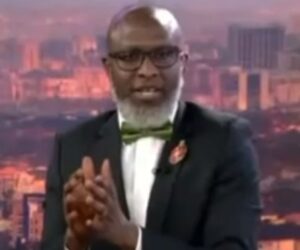Akande Urges Obasanjo to Take Responsibility for Nigeria’s Challenges and Apologize to the Nation
Akande Urges Obasanjo to Take Responsibility for Nigeria’s Challenges and Apologize to the Nation

Laolu Akande, a former presidential aide, has called on former President Olusegun Obasanjo to acknowledge his part in Nigeria’s current predicaments and issue a public apology to the country. Speaking on Sunrise Daily, a program on Channels Television, Akande emphasized that Obasanjo, as a key figure in Nigerian politics, should own up to his actions and inactions during his time in office.
Akande’s comments came in response to Obasanjo’s recent call for a major overhaul of Nigeria’s electoral system, which included demands for the dismissal of the Chairman of the Independent National Electoral Commission (INEC), Mahmood Yakubu, and other officials. Obasanjo, speaking at the Chinua Achebe Leadership Forum at Yale University, described Nigeria as a “failed state” and urged reforms to address its numerous issues.
However, Akande contended that Obasanjo, who served as president for three non-consecutive terms—first as a military ruler from 1976 to 1979, and later as a civilian president from 1999 to 2007—cannot avoid some responsibility for Nigeria’s struggles today. “Obasanjo has been in power for a total of 11 years, and no one has had the kind of experience he has had in managing the country. He must take some responsibility for the state of the nation,” Akande argued.
He went on to suggest that if Obasanjo were to be truly honest, he should admit his role in the challenges Nigeria faces today. “Obasanjo is part of the problem, and it would be disingenuous for anyone to ignore that fact,” Akande stated. He cited several examples of Obasanjo’s controversial decisions during his time in office, including the famous case of the National Assembly receiving cash deliveries and the use of state funds to support the building of his presidential library. According to Akande, these actions undermined efforts to fight corruption, making it hypocritical for Obasanjo to now speak out against the issue.
Akande also criticized Obasanjo for blaming others while ignoring his own role in the country’s decline. “Obasanjo cannot talk about corruption without taking responsibility for his own actions when he was in power,” Akande emphasized. “If he won’t own up to that, then he should remain silent.”
The former presidential aide also pointed out that other former Nigerian leaders, including General Ibrahim Babangida and General Abdulsalami Abubakar, have largely stayed out of the public debate about Nigeria’s future, likely because they do not want to be criticized as Obasanjo has been. Akande argued that Obasanjo’s actions, particularly regarding his personal disputes with current President Bola Tinubu, have clouded his judgment. He recalled how Obasanjo withheld local government allocations from Lagos State during Tinubu’s tenure as governor, even after the Supreme Court ruled that this was illegal. Akande also referred to the controversial 2003 elections, where Obasanjo allegedly used electoral malpractices to weaken opposition in the South-West, leaving Tinubu as the sole governor to hold out against the onslaught.
Akande suggested that Obasanjo’s public statements should focus on acknowledging his own failings, rather than pursuing personal vendettas against political opponents. He argued that Obasanjo owes Nigerians an apology for his role in the country’s problems. “If Obasanjo continues to criticize others, we must question his moral authority,” Akande said. “He has to own up to his past mistakes. Only then can we begin the process of healing and accountability for Nigeria.”
In conclusion, Akande called for genuine self-reflection and accountability, urging Obasanjo to take responsibility for his actions as a first step toward addressing the country’s deep-rooted issues. “Obasanjo must face the reality of his role in Nigeria’s decline, and this is the only way forward for true progress,” he concluded.
The legacy of Olusegun Obasanjo remains deeply divisive in Nigeria, with some praising his contributions to the nation’s development, while others blame his administration for laying the groundwork for many of the systemic problems the country faces today.
TRENDING SONGS
 NPMA Appeals to Nigerian Government for Compensation After Lagos Market Fire
NPMA Appeals to Nigerian Government for Compensation After Lagos Market Fire
 Rest Every Four Hours, FRSC Issues Safety Guide for Fasting Motorists
Rest Every Four Hours, FRSC Issues Safety Guide for Fasting Motorists
 NNPC Boss Ojulari Bags UK Energy Institute Fellowship
NNPC Boss Ojulari Bags UK Energy Institute Fellowship
 Shock in Anambra: Bride Disappears Moments Before Wedding
Shock in Anambra: Bride Disappears Moments Before Wedding
 Nigerian Woman Returns ₦330 Million Accidentally Credited to Her Account
Nigerian Woman Returns ₦330 Million Accidentally Credited to Her Account
 APC Don Reach Morocco?’ VeryDarkMan Reacts to Seyi Tinubu Poster
APC Don Reach Morocco?’ VeryDarkMan Reacts to Seyi Tinubu Poster
 Bride Breaks Down in Tears as Wedding Meals Were Kept Secretly While Guests Go Home Hungry
Bride Breaks Down in Tears as Wedding Meals Were Kept Secretly While Guests Go Home Hungry
 Odogwu by Day, Robber by Night: How Marriage Joy Turned Into Tragedy
Odogwu by Day, Robber by Night: How Marriage Joy Turned Into Tragedy
 Nigerian Officials Allegedly Pocket N4–6B Weekly Through Smuggling Cartels at Seme–Badagry Border
Nigerian Officials Allegedly Pocket N4–6B Weekly Through Smuggling Cartels at Seme–Badagry Border
 Ahmad Yerima: Naval Officer to Face No Sanctions After Clash with Wike – Matawalle
Ahmad Yerima: Naval Officer to Face No Sanctions After Clash with Wike – Matawalle
Share this post with your friends on ![]()













